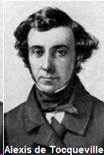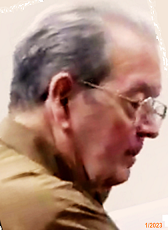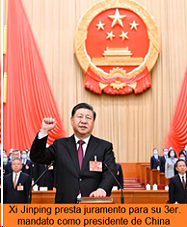 In 1831, a French aristocrat named Alexis de Tocqueville was commissioned to travel to the United States of America and report back on its prison systems. Once he arrived, however, Tocqueville became broadly fascinated with the upstart nation. Spending nine months in the U.S., Tocqueville richly observed the American people and America’s political system. His observations were published in two volumes, in 1835 and 1840, titled Democracy in America. Many things intrigued Tocqueville about America, and one of those was the practice of the Catholic faith in early America. Tocqueville’s insights ring true even today.
In 1831, a French aristocrat named Alexis de Tocqueville was commissioned to travel to the United States of America and report back on its prison systems. Once he arrived, however, Tocqueville became broadly fascinated with the upstart nation. Spending nine months in the U.S., Tocqueville richly observed the American people and America’s political system. His observations were published in two volumes, in 1835 and 1840, titled Democracy in America. Many things intrigued Tocqueville about America, and one of those was the practice of the Catholic faith in early America. Tocqueville’s insights ring true even today.
When John F. Kennedy ran for office, some people openly and angrily insisted that his Catholic faith would make it impossible to properly serve as president. (Strangely enough, no one seemed to make that objection during Joe Biden’s campaign, but that is a story for another time.) More recently, U.S. Sen. Dianne Feinstein, D-Calif., insinuated that Amy Coney Barrett’s practice of her faith would stand in the way of her functioning as a Supreme Court justice. At Barrett’s hearing, Feinstein addressed her: “When you read your speeches, the conclusion one draws is that the dogma lives loudly within you, and that’s of concern.”
There is an anti-Catholic attitude that Catholicism somehow makes one unfit for either American citizenry or governance, but that stance was diametrically opposed to Tocqueville's beliefs. He posits, “I think that the Catholic religion has erroneously been looked upon as the natural enemy of democracy.” And that was not only a philosophical stance, but one formed by observation of early America. Tocqueville writes, “At the present moment more than a million Christians professing the truths of the Church of Rome are to be met with in the Union. The Catholics are faithful to the observances of their religion; they are fervent and zealous in the support and belief of their doctrines. Nevertheless, they constitute the most republican and the most democratic class of citizens which exists in the United States.” 
Tocqueville, a Catholic himself, certainly realized that human law proceeds from eternal law; thus, all men are subject to it. From the Catholic perspective, no one is above the law or above justice. He writes, “On doctrinal points, the Catholic faith places all human capacities upon the same level; it subjects the wise and ignorant, the man of genius and the vulgar crowd, to the details of the same creed; it imposes the same observances upon the rich and needy, it inflicts the same austerities upon the strong and the weak, it listens to no compromise with mortal man, but, reducing all the human race to the same standard, it confounds all the distinctions of society at the foot of the same altar, even as they are confounded in the sight of God.”
- Hits: 1072
 Muchas universidades están ejerciendo una notable presión ideológica de tendencias socialistas sobre su profesorado en Estados Unidos y en otras partes, hasta el punto de bloquear la carrera académica de muchos que se atreven a expresar ideas distintas de las que son consideradas "políticamente correctas" y también sobre los estudiantes amenazados con reprobar por manifestar posturas críticas al discurso oficial.
Muchas universidades están ejerciendo una notable presión ideológica de tendencias socialistas sobre su profesorado en Estados Unidos y en otras partes, hasta el punto de bloquear la carrera académica de muchos que se atreven a expresar ideas distintas de las que son consideradas "políticamente correctas" y también sobre los estudiantes amenazados con reprobar por manifestar posturas críticas al discurso oficial. El nivel de consagración y de concentración del poder en manos de Xi solo es comparable con el que tuvo el Gran Timonel Mao Zedong durante el período del «culto a la personalidad» o el de los grandes emperadores de la milenaria Historia china. Razón por la cual el calificativo de emperador no es exagerado ni peyorativo en el caso del camarada Xi.
El nivel de consagración y de concentración del poder en manos de Xi solo es comparable con el que tuvo el Gran Timonel Mao Zedong durante el período del «culto a la personalidad» o el de los grandes emperadores de la milenaria Historia china. Razón por la cual el calificativo de emperador no es exagerado ni peyorativo en el caso del camarada Xi. general del Comité Central del Partido Comunista chino desde el 15 de noviembre de 2012, presidente de la Comisión Militar Central desde el 15 de marzo de 2013 y presidente de la República Popular de China desde 2013.
general del Comité Central del Partido Comunista chino desde el 15 de noviembre de 2012, presidente de la Comisión Militar Central desde el 15 de marzo de 2013 y presidente de la República Popular de China desde 2013. A June 8 article in The Wall Street Journal (WSJ) reported that the communist regimes of Cuba and China had reached an agreement on a cash-for-spying scheme. Beijing would pay Havana billions to install a state-of-the-art electronic eavesdropping facility on the island. The WSJ credited the information to an intelligence source. CNN also claimed to validate the WSJ report from its intelligence information pool. Both media outlets imply that the Cuban dictatorship has granted China permission to do this. Would this be a novel occurrence?
A June 8 article in The Wall Street Journal (WSJ) reported that the communist regimes of Cuba and China had reached an agreement on a cash-for-spying scheme. Beijing would pay Havana billions to install a state-of-the-art electronic eavesdropping facility on the island. The WSJ credited the information to an intelligence source. CNN also claimed to validate the WSJ report from its intelligence information pool. Both media outlets imply that the Cuban dictatorship has granted China permission to do this. Would this be a novel occurrence? overarching symbiotic affair with the USSR. The fall of Soviet communism and the subsequent 8-year hiatus of the short-lived Russian democratic experiment (1991-1999) which died with Vladimir Putin’s post-Soviet authoritarianism, brought Castroism closer to Mao’s heirs. Excluding Venezuela, which is a virtual Cuban colony, China has become Cuba’s most important trading partner. The bond has not just been commercial.
overarching symbiotic affair with the USSR. The fall of Soviet communism and the subsequent 8-year hiatus of the short-lived Russian democratic experiment (1991-1999) which died with Vladimir Putin’s post-Soviet authoritarianism, brought Castroism closer to Mao’s heirs. Excluding Venezuela, which is a virtual Cuban colony, China has become Cuba’s most important trading partner. The bond has not just been commercial. Como fue informado en este medio, la ONG
Como fue informado en este medio, la ONG